The AMD 2nd Gen Ryzen Deep Dive: The 2700X, 2700, 2600X, and 2600 Tested
by Ian Cutress on April 19, 2018 9:00 AM ESTCPU Encoding Tests
One of the interesting elements on modern processors is encoding performance. This includes encryption/decryption, as well as video transcoding from one video format to another. In the encrypt/decrypt scenario, this remains pertinent to on-the-fly encryption of sensitive data - a process by which more modern devices are leaning to for software security. Video transcoding as a tool to adjust the quality, file size and resolution of a video file has boomed in recent years, such as providing the optimum video for devices before consumption, or for game streamers who are wanting to upload the output from their video camera in real-time. As we move into live 3D video, this task will only get more strenuous, and it turns out that the performance of certain algorithms is a function of the input/output of the content.
All of our benchmark results can also be found in our benchmark engine, Bench.
7-Zip 9.2: link
One of the freeware compression tools that offers good scaling performance between processors is 7-Zip. It runs under an open-source licence, is fast, and easy to use tool for power users. We run the benchmark mode via the command line for four loops and take the output score.
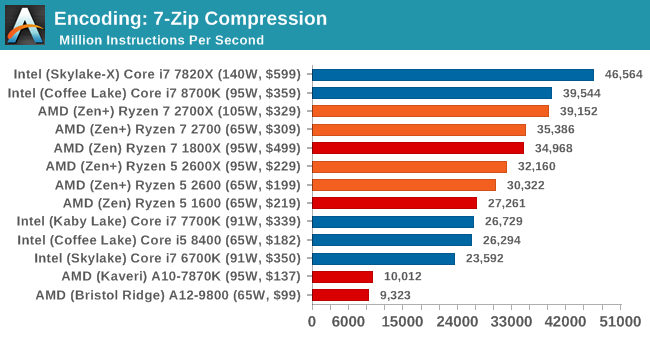
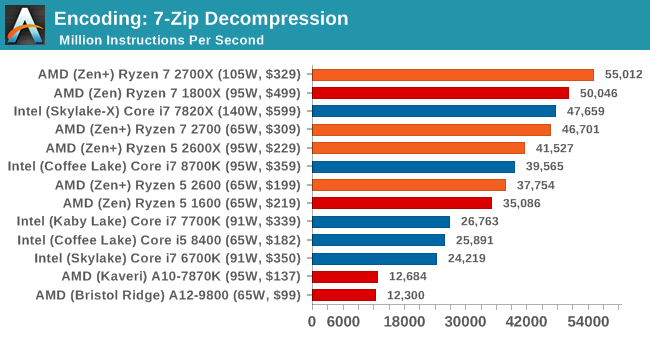
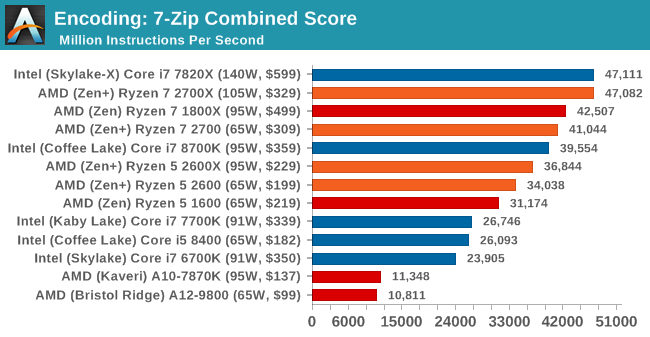
WinRAR 5.40: link
For the 2017 test suite, we move to the latest version of WinRAR in our compression test. WinRAR in some quarters is more user friendly that 7-Zip, hence its inclusion. Rather than use a benchmark mode as we did with 7-Zip, here we take a set of files representative of a generic stack (33 video files in 1.37 GB, 2834 smaller website files in 370 folders in 150 MB) of compressible and incompressible formats. The results shown are the time taken to encode the file. Due to DRAM caching, we run the test 10 times and take the average of the last five runs when the benchmark is in a steady state.
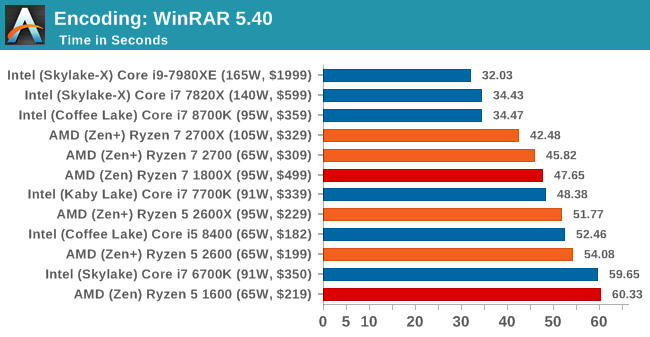
WinRAR requires a good memory base, so we see the quad-channel processors heading up the pack. The high IPC of the Core i7-8700K also does well.
AES Encoding
Algorithms using AES coding have spread far and wide as a ubiquitous tool for encryption. Again, this is another CPU limited test, and modern CPUs have special AES pathways to accelerate their performance. We often see scaling in both frequency and cores with this benchmark. We use the latest version of TrueCrypt and run its benchmark mode over 1GB of in-DRAM data. Results shown are the GB/s average of encryption and decryption.
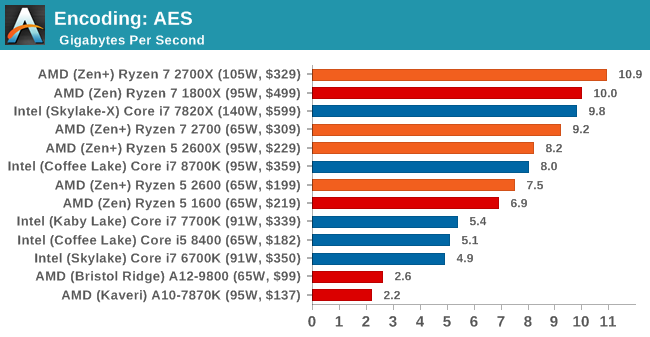
HandBrake v1.0.2 H264 and HEVC: link
As mentioned above, video transcoding (both encode and decode) is a hot topic in performance metrics as more and more content is being created. First consideration is the standard in which the video is encoded, which can be lossless or lossy, trade performance for file-size, trade quality for file-size, or all of the above can increase encoding rates to help accelerate decoding rates. Alongside Google's favorite codec, VP9, there are two others that are taking hold: H264, the older codec, is practically everywhere and is designed to be optimized for 1080p video, and HEVC (or H265) that is aimed to provide the same quality as H264 but at a lower file-size (or better quality for the same size). HEVC is important as 4K is streamed over the air, meaning less bits need to be transferred for the same quality content.
Handbrake is a favored tool for transcoding, and so our test regime takes care of three areas.
Low Quality/Resolution H264: Here we transcode a 640x266 H264 rip of a 2 hour film, and change the encoding from Main profile to High profile, using the very-fast preset.
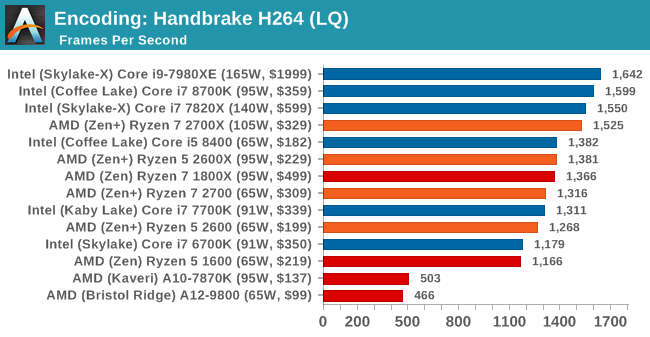
High Quality/Resolution H264: A similar test, but this time we take a ten-minute double 4K (3840x4320) file running at 60 Hz and transcode from Main to High, using the very-fast preset.
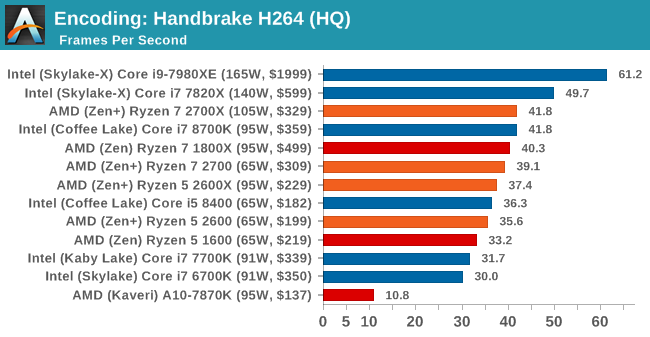
HEVC Test: Using the same video in HQ, we change the resolution and codec of the original video from 4K60 in H264 into 4K60 HEVC.
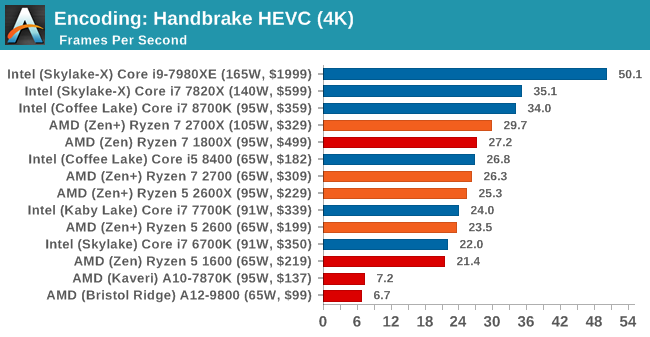
For HandBrake video encoding of large frames, there is a bump with the new Ryzen-2000 series processors over the previous generation, however there is still a gap up to the Core i7-8700K. The Core i5-8400 puts in a good showing here, above all but the best Ryzen parts.










545 Comments
View All Comments
spdragoo - Thursday, April 19, 2018 - link
Per Tom's Hardware (https://www.tomshardware.com/reviews/amd-ryzen-7-2..."Our test rigs now include Meltdown And Spectre Variant 1 mitigations. Spectre Variant 2 requires both motherboard firmware/microcode and operating system patches. We have installed the operating system patches for Variant 2.
Today's performance measurements do not include Intel's motherboard firmware mitigations for Spectre Variant 2 though, as we've been waiting for AMD patches to level the playing field. Last week, AMD announced that it’s making the mitigations available to motherboard vendors and OEMs, which the company says should take time to appear in the wild. We checked MSI's website for firmware updates applicable to our X370 platforms when AMD made its announcement, but no new BIOSes were available (and still aren't).
Unfortunately, we were only made aware that Variant 2 mitigations are present in our X470 board's firmware just before launch, precluding us from re-testing the Intel platforms with patches applied. We're working on this now, and plan to post updated results in future reviews.
The lack of Spectre Variant 2 patches in our Intel results likely give the Core CPUs a slight advantage over AMD's patched platforms. But the performance difference should be minimal with modern processors."
For those that are TL:DR in their viewpoint: unlike Anandtech, TH did NOT include all of the Spectre/Meltdown patches, & even said that there might be differences in their test results.
Chris113q - Thursday, April 19, 2018 - link
Other reviewers also had their setups meltdown/spectre patched and it's been already confirmed that these patches don't greatly impact gaming performance at all.It's clear that Anandtech's results are wrong here. I have read 12 other reviews and most of their results differ from the ones you got. You'd have to be delusional to take just 1 review as the absolute truth.
Ninjawithagun - Thursday, April 19, 2018 - link
Incorrect. Those reviews were conducted back in January 2018 (look at the review dates). Microsoft issued new patches for Meltdown and Spectre earier this month (April 2018). I could find no other performance review showing performance gain/loss for Intel CPUs based upon the new patches other than the one posted now by AnandTech.Ninjawithagun - Thursday, April 19, 2018 - link
The only way to know for sure is for each hardware reviewer to provide the exact version of Windows 10 they used for testing. This will prove whether or not they ran benchmarks with the most current Windows updates/patches.Intel999 - Thursday, April 19, 2018 - link
It is plausible that many reviewers were lazy and carried over data from earlier reviews on Intel and 1000 series Ryzen CPUs.Thank you Anandtech for doing aa genuinely unbiased review that required a great deal of extra work compared to others.
5080 - Thursday, April 19, 2018 - link
And don't forget BIOS patches as well. If you have a fully patched system the impact is even bigger than just updating with the Windows KB patches.sor - Thursday, April 19, 2018 - link
Looking at Tom’s results, they have OC intels in first place. Other than that it’s damn close. Is there a chance you’re just browsing graphs to see who is in the top spot and not really comprehending the results?Aside from that, the test setups and even benchmarks used are different. You owe Ian an apology for not realizing you’re comparing OC results to his.
Silma - Thursday, April 19, 2018 - link
Yes. Ian is a top reviewer. At worst he made a mistake in this evaluations. It happens to the best of us.However, I have an issue with non OC test. It seems to me people will purchase overclockable processors and graphic cards to overclock them. At least game results should probably be based on OC benchmarks.
pogostick - Thursday, April 19, 2018 - link
@Silma No, it makes more sense to do it this way. Everyone who buys these processors are guaranteed to have a part that will run the manufacturer spec. OC is a random lottery.ACE76 - Thursday, April 19, 2018 - link
Wrong... majority of even gamers DON'T overclock...that us relagated to a niche market of enthusiasts.